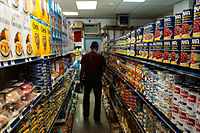
Photo from wikipedia
W e are now 20 years into an extensive scholarly conversation – which has spilled over into the public discourse – around ‘food deserts’. Since the term was coined in… Click to show full abstract
W e are now 20 years into an extensive scholarly conversation – which has spilled over into the public discourse – around ‘food deserts’. Since the term was coined in the 1990s hundreds of papers have been written on the subject. Public policy makers and state agencies influenced by this research have developed extensive tools and data sets, like the USDA’s food desert locator tool. Much of this work is focused on mapping food retailers in relationship to local population demographics, often race and economic status, to identify communities that lack access to a sufficient food retail environment. Food justice organizers have critiqued the framework of food deserts as an “outsider term”, invented by academics. Black urban gardener and food justice activist Karen Washington famously urged academics, policy makers, and non-profits to move away from the term because it erases what really goes on in these communities. In an interview published in Guernica, she argued that rather than talk about food deserts, we should talk about food apartheid because “when we say food apartheid, then the real conversation can begin.” Enter Ashanté Reese’s book Black Food Geographies: Race, Self-Reliance and Food Access in Washington, D.C., which meticulously documents the anti-Black racism and uneven capitalist urban development that create the conditions of food apartheid. In contrast to the barren emptiness implied by the term food desert, Reese also captures the resilience, creativity and dynamism that exist in the historically Black community of Deanwood in Washington, D.C. Expanding on the work of geographers like Katherine McKittrick and Clyde Woods (2007), Reese’s work challenges the overdetermined spatial analysis of food access that characterizes much of the food desert literature. Instead, she develops a social, historical and cultural analysis of how Black residents create their own geographies through investments in community uplift through food provisioning. Based on ethnographic and archival research, her book breaks important new ground by weaving together the history of food access in Deanwood and how that history lives and breathes in everyday people’s actions and imaginations today. Black Food Geographies is an important and accessible book for students and scholars in urban studies, geography, food studies, Black studies and anthropology. Black Food Geographies offers an in-depth analysis of how one Black community navigates and makes meaning out of a food
Journal Title: City
Year Published: 2019
Link to full text (if available)
Share on Social Media: Sign Up to like & get
recommendations!